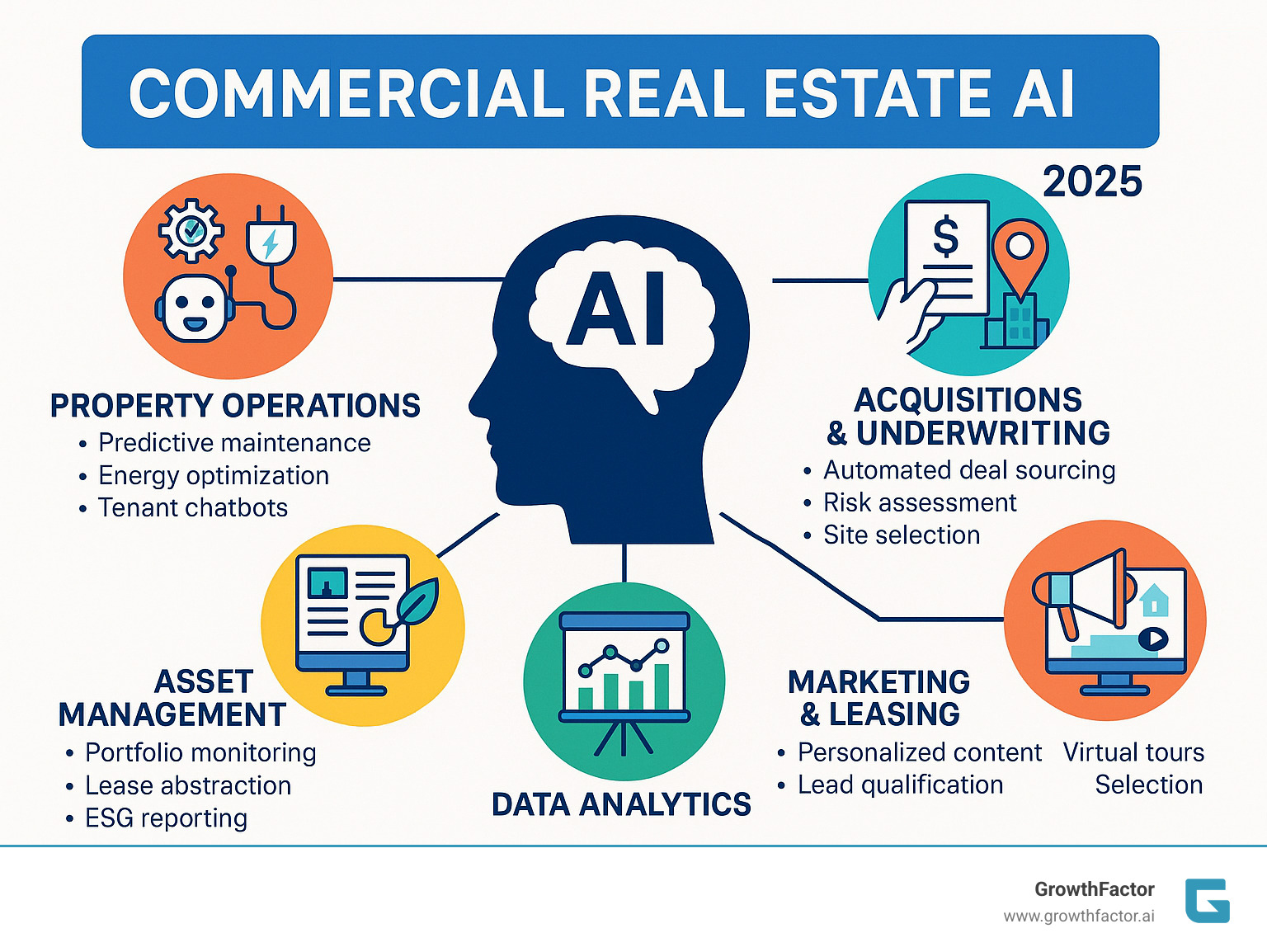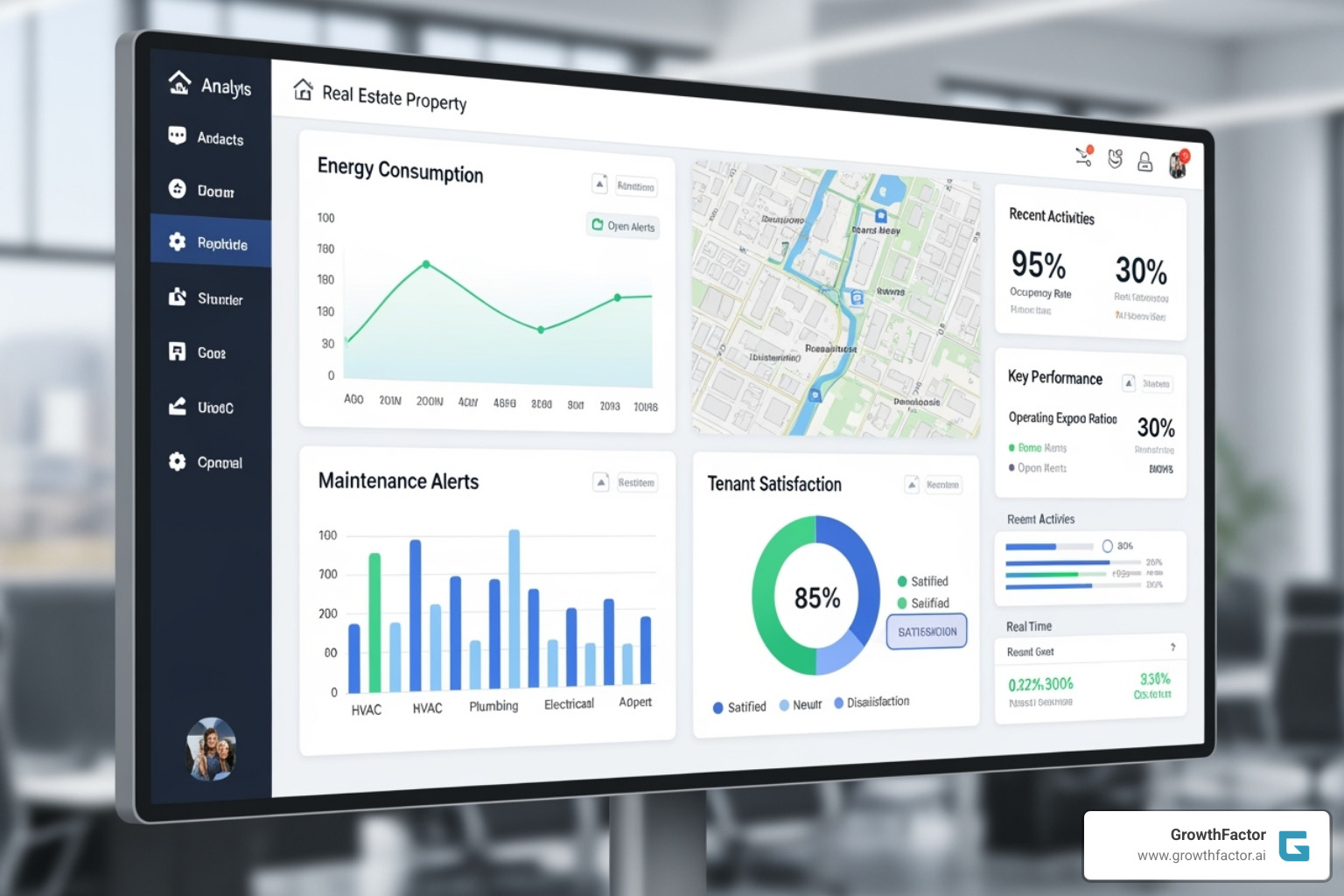Commercial Real Estate AI Guide: Compare Top Platforms & Tools (2025)
Written by: Clyde Christian Anderson
How Commercial Real Estate AI is Changing Property Operations and Investment Decisions

Commercial real estate AI is revolutionizing how professionals analyze markets, manage assets, and make investment decisions across property operations, acquisitions, asset management, marketing, and data analytics.
Amidst high interest rates and low office occupancy, AI offers a gateway to new efficiencies. Investor confidence is soaring, with private funding for generative AI reaching $25.2 billion in 2023. A Harvard Business School study highlighted AI's power, finding it helped consultants complete 12.2% more tasks and produce 40% higher quality work. For CRE professionals, these gains offer a significant competitive advantage.
However, adoption has challenges. Data fragmentation is a major barrier, with nearly 32% of CRE firms reporting data too fragmented to train AI models effectively. Privacy, job displacement, and copyright issues also cause apprehension.
This guide examines the opportunities and obstacles of AI adoption, exploring practical applications and strategic considerations for successful implementation.
I'm Clyde Christian Anderson, Founder and CEO of GrowthFactor.ai. My background in MIT-trained financial analysis and retail operations provides unique insights into solving real-world location and investment challenges with commercial real estate AI.

The AI Revolution in Commercial Real Estate: Opportunities and Challenges
We're at a watershed moment with commercial real estate AI, similar to the internet's arrival in the early 2000s, but the change is happening much faster. While CRE has traditionally adopted technology slowly, recent global shifts have accelerated the move toward digital solutions, with AI now an essential competitive tool. This is a fundamental shift in how we analyze properties and make decisions, requiring a balance of AI's benefits with thoughtful risk management. As Commercial Real Estate Tech evolves, successful firms will be those that adopt AI strategically.
Opening Up New Efficiencies and Business Models
Commercial real estate AI delivers immediate value through increased productivity. Tasks that once took hours, like generating marketing materials or analyzing demographic data, can now be automated in minutes. At GrowthFactor, we've seen teams evaluate five times more sites by automating previously manual qualification processes.
Cost reduction follows these efficiency gains, as AI handles routine tasks like initial property screening, allowing firms to scale without proportionally increasing headcount. The real game-changer is improved decision-making. AI processes vast datasets to identify patterns humans might miss, changing everything from valuation to market timing. Through Data Analytics Real Estate, firms gain comprehensive market understanding for smarter investments. These Real Estate Data Insights provide a crucial competitive edge.
AI also enables entirely new business models, such as automatically bidding on hundreds of properties daily or offering hyper-personalized client services through intelligent chatbots.
Navigating the Risks and Problems of AI Adoption
Will AI replace CRE professionals? The reality is more nuanced. The World Economic Forum job prediction suggests automation will create a net increase in jobs. The shift is about evolution, not replacement. AI excels at repetitive tasks, freeing professionals for relationship building and strategic negotiations. Microsoft's CEO Satya Nadella's "co-pilot" analogy is apt: AI assists, not replaces.
However, real risks exist. Data privacy concerns require robust governance to protect sensitive information and maintain client trust. Copyright issues with generative AI create complexity, though tech companies are developing data audit tools and offering legal indemnity. Upcoming legislation, like Canada's AI act expected by 2025-2026, will introduce mandatory requirements.
Algorithmic bias is another risk; biased training data can lead to discriminatory outcomes in tenant screening or property valuation. This requires careful data curation and monitoring.
The foundation of these challenges is data quality. Poor data costs the U.S. economy trillions annually. In CRE, fragmented data is a major barrier. The principle of "garbage in, garbage out" is paramount, making Data-Driven Site Selection essential for reliable AI insights. The path forward requires acknowledging these risks while building strong data foundations and maintaining human oversight.
Core Applications of Commercial Real Estate AI
The versatility of commercial real estate AI allows for custom solutions across different functional areas of CRE. AI isn't replacing your expertise—it's amplifying it by handling the heavy lifting of data processing and pattern recognition, freeing you to focus on strategic decisions.
Streamlining Property and Asset Management
Property and asset management is where AI shines in day-to-day operations, making buildings smarter and management more efficient.

- Predictive maintenance: AI analyzes sensor data to spot potential equipment issues before they become costly emergencies. Prologis, for example, uses AI to process drone imagery for roof inspections, cutting potential repair costs by up to 30%.
- Energy optimization: AI continuously monitors and adjusts building systems like HVAC and lighting based on occupancy and weather, saving money and helping meet sustainability goals.
- Tenant service chatbots: These AI platforms handle leasing inquiries, service requests, and payments, providing instant responses and improving tenant satisfaction. Learn more in our guide to AI Property Management Tools.
- Automated lease abstraction: AI tools extract key data from lease contracts for a fraction of the traditional cost, streamlining a time-consuming manual process. For more, see our article on AI-Powered Lease Abstraction.
- ESG reporting: AI aggregates and analyzes data on a property's environmental, social, and governance performance, simplifying compliance with stringent reporting requirements. Our AI for Asset Managers resource explores this.
Enhancing Acquisitions, Underwriting, and Development
The early stages of CRE deals are ripe for AI-powered efficiency gains.
- Automated deal sourcing: AI scans vast datasets to identify investment opportunities matching specific criteria. Our AI Agent Waldo enables teams to evaluate five times more sites efficiently. Our Real Estate Deal Analysis guide explores this technology.
- AI-powered underwriting: These models automatically parse financial documents and conduct market analysis, using predictive analytics to enable faster, more informed investment decisions. This is a major advance in AI Real Estate Underwriting.
- Site selection analysis: AI analyzes demographics, foot traffic, and zoning regulations to identify optimal locations, delivering insights in hours instead of months. This is key to effective Real Estate Site Selection.
- Generative design: An exciting frontier where AI creates multiple design iterations for a site, optimizing for space, cost, and functionality. This is becoming essential for modern AI for Property Development.
Revolutionizing CRE Marketing and Leasing
AI is enabling more personalized and efficient marketing and leasing strategies.
- Personalized marketing content: AI platforms generate custom, brand-specific emails and ads that resonate with target audiences, improving engagement.
- Automated lead generation: AI can identify potential sellers, update contact information, and alert brokers to opportunities, allowing them to focus on qualified leads. Our AI for Real Estate Brokers resource has more.
- AI-generated virtual tours: Technology can now create highly detailed and realistic virtual tours and 3D images from simple text descriptions, expanding marketing reach.
- Predictive market trend analysis: AI processes enormous datasets to forecast market shifts, enabling proactive leasing and investment strategies. The insights from AI Real Estate Market Analysis provide a significant competitive advantage.
Implementing AI: A Strategic Roadmap for CRE Firms
Successfully adopting commercial real estate AI requires a strategic approach that integrates technology thoughtfully into your firm's operations. Think of it as renovating a historic building—preserving its character while adding modern amenities.
Building Your Firm's AI Strategy
Start by identifying your biggest pain points. Is it manual lease review or the challenge of site evaluation? Use case selection should target these specific issues.

A technology roadmap will guide your "buy vs. build" decision. The right path depends on your resources and needs. We recommend starting small; our Starter plan at $200/month helps firms test AI without a massive investment. It's easier to scale from a success than recover from a failure.
Workforce change is a delicate aspect. Frame AI as a tool for augmentation, not replacement. It handles tedious tasks, freeing professionals for high-value work like negotiation and relationship building. This requires upskilling employees to work alongside AI. Effective change management involves creating an environment of open communication and experimentation.
The Foundation: Data Governance and Standardization
High-quality data matters more than fancy algorithms. If you feed an AI system poor data, you'll get poor insights. Investing in data cleaning and preparation is essential.
Data lineage and audit trails are critical for legal protection and building confidence in AI-driven decisions. You need to know where your data comes from and how it's used. Success also requires breaking down data silos by consolidating information scattered across different systems into a unified, accessible format.
This is why we emphasize Real Estate Data Intelligence—creating a single source of truth that turns AI into a competitive advantage.
Navigating the Legal and Ethical Landscape of commercial real estate AI
The legal landscape for commercial real estate AI is still evolving, requiring careful navigation.
- Data privacy compliance: Regulations like GDPR demand that privacy protection is built into AI applications from the start.
- Intellectual property rights: Generative AI raises questions about content ownership and copyright. Many AI vendors now offer legal indemnity, but clear internal policies are still necessary.
- Mitigating algorithmic bias: AI models trained on biased historical data can perpetuate discriminatory outcomes. The Fair Housing Act highlights the need for transparent, explainable AI.
- Evolving regulations: Stay informed about developing frameworks, like Canada's voluntary AI code of conduct which is moving toward formal legislation. A proactive approach to these challenges is key to sustainable AI success.
The Future of Commercial Real Estate AI
The commercial real estate AI landscape is evolving at breakneck speed. We're at a point similar to the dawn of the smartphone era—the changes coming will reshape the industry in ways we're just beginning to imagine.
The Rise of AI Agents and Hyper-Automation
The next leap is AI agents—digital entities that can think, plan, and execute complex tasks autonomously. Imagine a digital coworker that processes thousands of property listings overnight, making contextual decisions and adapting to new information like a tireless junior analyst.

This enables hyper-automation, where entire workflows are orchestrated by AI. An agent could identify an opportunity, run due diligence, prepare financial models, and flag red flags before a human even sees the listing. At GrowthFactor, our Waldo - The AI Agent for Retail Site Selection already gives teams this superpower, but this is just the beginning. These agents will also enable hyper-personalization, crafting experiences that understand the subtle preferences of individual clients and investors.
Long-Term Implications for the CRE Industry
The ripple effects of AI will touch every corner of the industry.
Property values are already reflecting AI's influence through more accurate, dynamic valuations. As Jim Costello from MSCI Research notes, while AI might dampen office demand, it also drives economic growth that creates demand in other real estate sectors.
The demand for data centers is exploding. AI's computational hunger is insatiable, and AI companies have nearly doubled their U.S. real estate footprint in two years, with projections to more than double again by 2030. This is one of the biggest real estate booms of our generation.
The changing role of CRE professionals is the most significant shift. As Sean Ward from CBRE notes, AI will analyze underwriting in seconds, fundamentally changing daily tasks. This isn't about replacement but empowerment. Professionals who thrive will be those who partner with AI. Experts like Scott Dunphy from MetLife and Lindsey Burke from Greenpoint Ventures advise professionals to invest in AI skills to combine industry knowledge with technology.
New skill requirements are emerging, such as prompt engineering and interpreting algorithmic outputs. However, core skills like negotiation and relationship building are becoming more valuable as AI handles routine analysis. As I discuss in Your Broker is Using a Flip Phone, the professionals who adapt fastest will gain an enormous competitive advantage.
Frequently Asked Questions about AI in Commercial Real Estate
Navigating commercial real estate AI can be overwhelming. Here are straight answers to the most common questions we hear from CRE professionals.
Will AI replace commercial real estate professionals?
No, but a professional using AI will likely outperform one who isn't. The technology is designed for augmentation, not replacement. Think of AI as a "co-pilot," a term popularized by Microsoft's Satya Nadella. It handles data analysis and routine tasks, freeing you to focus on high-value human skills: building relationships, negotiating complex deals, and strategic decision-making. The trust you build with clients and your market intuition cannot be automated.
What is the single biggest barrier to AI adoption in CRE?
Without question, it's data quality and accessibility. The CRE industry struggles with fragmented and unstructured data scattered across multiple systems. This lack of standardization makes it difficult to train reliable AI models. You need good data to make AI work, but organizing that data requires significant upfront investment. The firms that tackle this data infrastructure challenge first will gain a major competitive advantage.
How can smaller CRE firms start using commercial real estate AI?
You don't need a massive budget to start. Begin with off-the-shelf tools to experience AI's benefits without major upfront costs. Focus on a specific pain point, like writing property descriptions or abstracting leases, and find an AI solution for that problem. Many existing software platforms (CRMs, property management systems) now include AI features, offering immediate value.
Accessible AI tools for CRE include generative text and image creators, data analysis tools for spreadsheets, and specialized applications for tasks like underwriting. Our Starter ($200/month), Core ($1,000/month), and Enterprise (custom) plans are designed to make powerful commercial real estate AI accessible to firms of all sizes, allowing you to start small and scale as you grow.
What are the best commercial real estate AI platforms in 2025?
The leading commercial real estate AI platforms in 2025 include:
- GrowthFactor - Best for retail site selection and portfolio optimization. Features transparent "glass box" AI scoring, custom models trained on your data, and expert analysts on-demand. Customers report 99.8% accuracy in site selection and 5x more sites analyzed per expansion cycle.
- Cherre - Strong in data integration and real estate analytics for institutional investors.
- Reonomy - Good for property intelligence and ownership data across commercial properties.
- Placer.ai - Specializes in foot traffic analytics for retail and commercial properties.
- Yardi - Enterprise property management with AI-enhanced lease abstraction and portfolio tools.
The best choice depends on your specific use case. For retail site selection and expansion planning, GrowthFactor offers the most comprehensive solution with built-in expert verification.
How much does commercial real estate AI software cost?
CRE AI platform pricing varies widely based on features and scale:
- Entry-level platforms: $200-$500/month for growing firms with basic needs
- Mid-market solutions: $1,000-$5,000/month for expanding organizations with advanced analytics
- Enterprise platforms: $10,000-$100,000+/year for large portfolios with custom integrations
GrowthFactor pricing starts at $200/month (Starter) for growing retailers under 10 locations, $1,000/month (Core) for expanding retailers, and custom Enterprise pricing for large organizations. Unlike many competitors, GrowthFactor includes unlimited user seats and expert analyst access at no extra cost.
How does GrowthFactor compare to other CRE AI platforms?
GrowthFactor differentiates from competitors in several key ways:
- Glass box, not black box: Unlike platforms with opaque AI scoring, GrowthFactor shows exactly why a site scores the way it does—fully transparent and auditable.
- All data in one place: Demographics, foot traffic, vehicle traffic, competition, and analogs in a single platform—no juggling multiple tools.
- Custom scoring models: AI trained on YOUR store performance data, not generic industry averages.
- No seat limits: Bring your entire team under one organization at no extra cost (Core and Enterprise plans).
- Expert analysts included: On-demand human verification from market strategists with 50+ years combined experience—a layer most software-only platforms lack.
- Proven results: Cavender's Western Wear opened 27 new locations in 2025 (vs. 9 in 2024 pre-GrowthFactor), and Books-A-Million saves 25 hours per week.
What features should I look for in a CRE AI platform?
When evaluating commercial real estate AI platforms, prioritize these features:
- Transparent AI scoring: Can you see why a property scores the way it does, or is it a black box?
- Data integration: Does it aggregate demographics, traffic, competition, and market data in one view?
- Custom model training: Can you train scoring models on your own portfolio data?
- Collaboration tools: Deal pipeline management, document storage, and team visibility.
- Cannibalization analysis: Can you model how new locations impact existing stores?
- Sales forecasting: Does it provide AI-powered revenue projections for potential sites?
- Human verification layer: Access to expert analysts for GO/NO-GO recommendations.
- Fast implementation: Setup in days, not months of enterprise onboarding.
Conclusion: Embracing the AI-Powered Future of CRE
The commercial real estate AI revolution is here. We've seen how it's reshaping everything from property operations to investment decisions, offering unprecedented efficiency and a powerful competitive edge. While challenges like data quality and privacy exist, they are manageable with a strategic, human-centric approach.
The future of CRE belongs to those who accept intelligent collaboration. AI is your co-pilot, handling the data crunching so you can focus on what humans do best: building relationships, negotiating deals, and thinking strategically. This partnership is the key to success.
At GrowthFactor, we're actively shaping this future in retail real estate. Our AI-powered platform, featuring our proprietary AI Agent Waldo, helps clients evaluate five times more sites efficiently, automating tedious qualification processes to accelerate growth.
The window of opportunity to use commercial real estate AI as a competitive differentiator is open now, but it won't be forever. The firms that act now—building strategies, investing in data, and upskilling their teams—will lead the industry.
Ready to see what AI can do for your retail portfolio? Find our All-in-One Real Estate Platform for Retail and find how intelligent technology can transform your deal analysis.
Citations
The human algorithm
Request Your demo
Schedule meeting
Or submit your information below and we'll be in touch to schedule.


